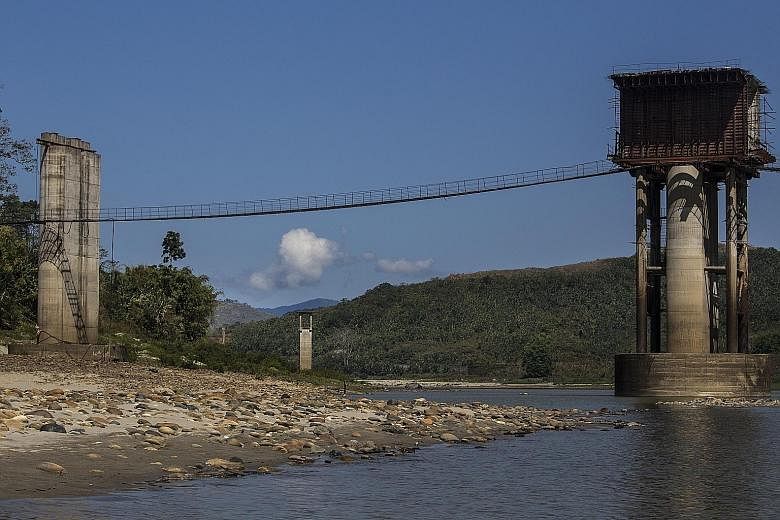AUNG MYIN THA (Myanmar) • For six years, Ms Kaw Bu has waited to return to the village that she was forced to leave to make way for a dam that has yet to be built.
"I pray to God to let me work on my own land again," she said, sitting outside the wood-shingled home in Myanmar's Aung Myin Tha, where she was resettled in early 2011.
She may get her answer soon, when a government-appointed commission makes a recommendation on the fate of the US$3.6 billion (S$5 billion) Chinese-financed Myitsone Dam nearby.
The decision is a daunting test for Myanmar's leader, Ms Aung San Suu Kyi, who risks angering China - the region's economic powerhouse - if she cancels the project, or the public if she lets it go forward.
Analysts say that the commission's report would provide her with the political cover to kill an unpopular white elephant that she inherited from Myanmar's former military government.
But getting out of the deal would be difficult. If her government cancels the project outright, it could have to repay some US$800 million that the state-owned Chinese developer says it has already spent on the project.

If Myanmar offers China other dam projects in return - a compromise that her government has floated - they are likely to impinge on disputed ethnic areas where they could threaten the peace talks she has championed since her political party came to power last year.
"If she is the leader she claims to be, I think she should cancel" the dam, said Ms Yun Sun, a specialist on China-Myanmar relations at the Stimson Centre, a non-partisan think-tank in Washington.
"But then she has to somehow deal with an US$800 million disbursed investment. It cannot be swept under the carpet without giving China something major, and I cannot think of anything that she could give to China without generating a bigger pushback."
The Myitsone Dam is among the largest of many Chinese-financed energy and mining projects approved by the junta that ruled Myanmar until 2011. It is especially contentious because it would be the first dam to cross the Irrawaddy River, the mythic cradle of civilisation for Myanmar's ethnic majority.
But as Myanmar moved towards democracy and controls loosened on public expression, rising anti-Chinese sentiment burst into the open, and the dam became a focus of protest.
While officials said that the dam would provide Myanmar with much-needed cash and electricity, critics said it would cause irreparable harm to the river, destroy fish stocks downstream and displace thousands of villagers.
But perhaps the most incendiary objection was to the notion that under the deal struck by the ruling generals, 90 per cent of the dam's electricity could go to China.
A person who supports the dam and is familiar with the contract, speaking on the condition of anonymity, said that Myanmar was guaranteed 10 per cent of the dam's electricity at no cost and could buy more on request.
The government's 15 per cent stake in the dam would earn it about US$18 billion over a 50-year concession period, analysts and local news reports said.
As protests spread to Myanmar's cities, Ms Suu Kyi, who was the country's revered pro-democracy leader at the time, spoke out against the dam. In 2011, the military-backed transitional government yielded to public pressure and suspended the project.
The decision shocked Chinese officials and businessmen. Many remain incredulous that the dam was delayed at all in a country that needs more electricity to power its fast-growing economy.
Officials close to Ms Suu Kyi have said that negotiations were under way for Myanmar to pay China, or apply the money to other projects, if the dam is not built.
NEW YORK TIMES

